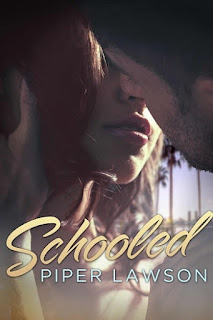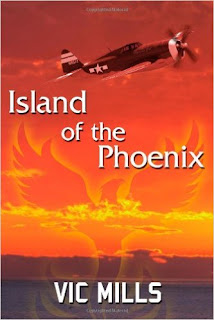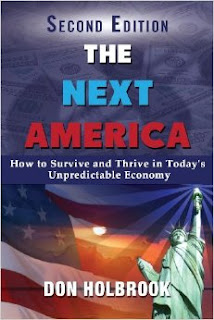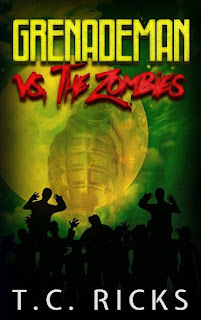Today we are interviewing Nicholas Tanek about his coming-of-age memoir "Chipped Black Nail Polish."
Tell us a bit about yourself.My name is Nicholas Tanek and I am an author in my late 30’s. I used to be a punk rock New Jersey skater kid who got involved with the New York City rave scene during the 1990’s. I struggled with hardcore drug addiction. I am addicted to music. I am also somewhat involved in the BDSM fetish community. I wrote two books. The first book is titled The Coolest Way To Kill Yourself and the second book is a prequel titled Chipped Black Nail Polish.
Describe the plot of your new book in a few sentences.
My new book is titled Chipped Black Nail Polish. It is a prequel to The Coolest Way to Kill Yourself. It is a true coming of age story that is a tribute to the very first love of my life, a punk rock girl named Kim. She was very wild and very troubled. We got involved in the New Jersey punk rock scene in 1989. It is a story about embracing your eccentricity and individuality.
Who do you think would most appreciate this book?
People who are eccentric and are far from the norm. People who embrace their individuality would appreciate this book. Also, people who really love music will, too.
More than two decades after the events in your book, what inspired you to finally publish a work about your transformative experience with love in the late 1980s?
Good question. First, writing The Coolest Way to Kill Yourself was very cathartic for me and also very therapeutic. The response was also very positive and it changed my life. That gave me confidence to write Chipped Black Nail Polish. So, my editor, my street team, and my fans were very supportive. Another aspect was some of the people in the indie rock scene as well as the FOTs (Friends of Tom) from The Best Show with Tom Scharpling (http://thebestshow.net). There is a whole bunch of indie rock people out there who just love music. Mix all of those together and I got very nostalgic. I felt I had to tell this story, too.
Did you learn anything new when writing the book and revisiting the past?
Yes. I learned how to be a better person. Writing about the past and reliving the mistakes taught me to examine my life. I examined what I did wrong and what other people did wrong. Learning from this, helped me moved forward. With all the drugs and crime that have been in my life, I still think I am a decent person. I can live life, spread love, make friends, and make people laugh. Another main thing about writing about the past is being completely honest. My books are brutally honest about myself. I think people can relate to that. I am also unapologetic about my honesty. I write about sex, drugs, and crime in my life. So, for me, that is very freeing.
Music plays a big role in the story. Is music as important to you now as it was back then?
Music has been important to me for as long as I can remember. It is essential to everything I do.
Do you have a scene in the story that was your favorite to write?
In Chipped Black Nail Polish, I loved writing about going to the punk rock shows. There is a scene where we see The Dead Milkmen and I like to think it captures the energy of the punk rock scene. Also, there is the party scene where all hell breaks loose.
Are there any authors who have influenced your writing style?
Hunter S. Thompson and Truman Capote. I do like when writers put themselves in the story.
Tell us about your creative process, from initial idea to published manuscript.
Since the stories are true, I know the whole story. So, I have it in my head from beginning to end. Then, I just write, write, and write. Then, we edit, edit, and edit more. I cannot stress how important it is to edit with someone. When my editor and I edit, we make it fun. Although the task takes a tremendous amount of effort, we do not make it feel like work. Then, I have to deal with the publishing company. That can be annoying sometimes because publishing companies are all about business. I have to approve everything from the covers to the style. Then, it comes out.
How do you feel about the increasing popularity of ebooks?
I love them and hate them. Chipped Black Nail Polish uses physical media like records and books as a metaphor. Physical media is dying and that means the charm of holding a piece of art in your hand is dying. That’s sad. When I get a record, I like holding it in my hand, looking at the cover, and reading the liner notes. I would always rather hold a physical book in my hand. I sell more eBooks than physical books, but I personally do not think eBooks are as cool as physical books. What is cool about eBooks is that my work can reach many people all over the world. If it were not for the eBook, I would not have my little following.
What are your goals as a writer for the next ten years?
Write more books. I want to help other artists be creative. I would love to write for television or film, too.
Is there any aspect of writing you don't like?
I love the writing process. The publishing aspect can be annoying. There is some tension in the indie author community between authors, but I don’t get involved with that. I just do my thing and keep positive.
What do you have in mind for your next project?
My next project is the sequel to The Coolest Way to Kill Yourself. After the love of my life died, I threw myself into the NJ/NY BDSM fetish community. It’s not a love story, but it is a tribute to the wild and kinky people who helped me cope with my grief. There is a huge amount of sexuality in this new project. Many authors write about the BDSM fetish community being dark and dangerous. Sure, it can be, but many of the people there are fun and just very sexual. It’s kind of like a big underground party spread out over cities. I’m trying to capture that. At the same time, the book will be a very funny book about dealing with loss and grief.
Is there anything else you'd like potential readers to know about your book?
I think my books are unique and original. I am proud of that. My books are all true. I just change some names and label them fiction. Yeah… fiction…sure.
Book blurb for "Chipped Black Nail Polish":
In New Jersey during the summer of 1989, an awkward thirteen-year-old who was obsessed with weird music fell head-over-heels in love with the coolest post-punk rock girl he had ever met.
Nicholas was insecure. He was a daydreamer, wishing for romance when he was told, over and over, that he could not have it. He was a toy, pulled and pushed, wanted and used, dragged along yet held at a distance. Nicholas fell in with the out crowd, and loved every minute of it. He fell in love and got left behind, but not before she changed him forever.
This is an irrational, emotional love story for the teenager inside all of us.
The music is loud, and you're about to be pushed into the pit.
Buy "Chipped Black Nail Polish" on Amazon
Book blurb for "The Coolest Way to Kill Yourself":
The Coolest Way to Kill Yourself pulls you into the early 90’s New York City rave scene, in all its chaotic, psychedelic glory. The narrator grabs you by your wrist and drags you behind two teenage lovers from New Jersey as they tumble through a whirlwind of reckless hedonism that eventually spirals into a dark, devastating world of drug addiction and heartbreak.
As a teenager, Lynn cried, “No one is ever going to write something for me.”
Nearly two decades later, in the aftermath of Hurricane Sandy, Nicholas did just that. The gesture came too late for our unlikely heroine, but his heart was in the right place. A broken heart… but a true love.
Reunited after years apart, Lynn and Nicholas embraced their love and sexuality, and embraced each other, despite troubled pasts, despite illness, despite all of their imperfections and mistakes. They shared the kind of honest and shameless connection that few have had the honor of knowing, and most would never understand.
“We’re not hurting anyone. We’re just living life without caring what anyone thinks about us, without caring about the consequences.”
“It’s the coolest way to kill ourselves,” Lynn said.
So turn the page, and pull the trigger.
Buy "The Coolest Way to Kill Yourself" on AmazonConnect With Nicolas Tanek
Like Nicholas Tanek on Facebook
Follow Nicholas Tanek on Twitter














